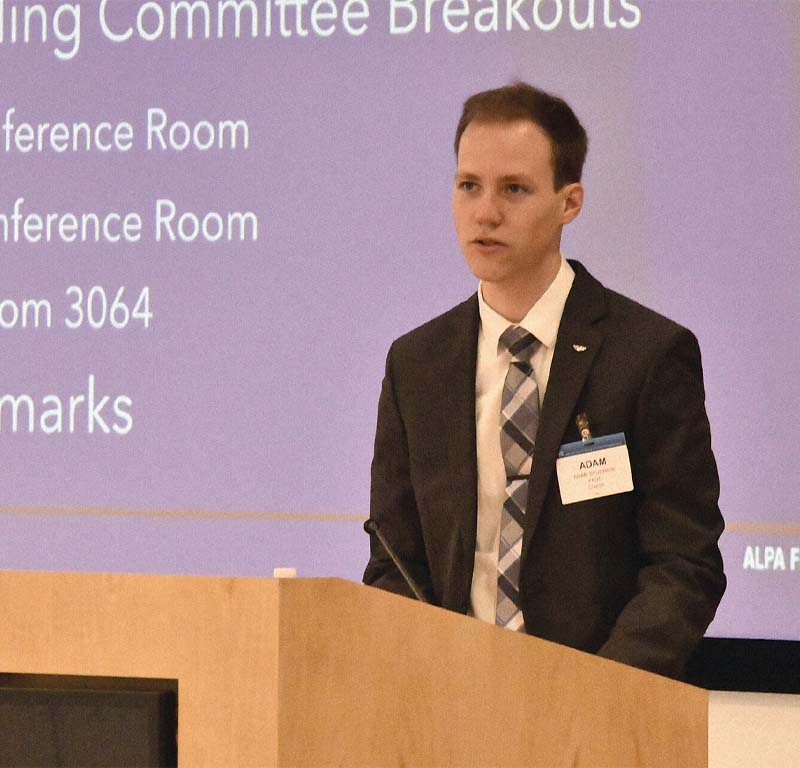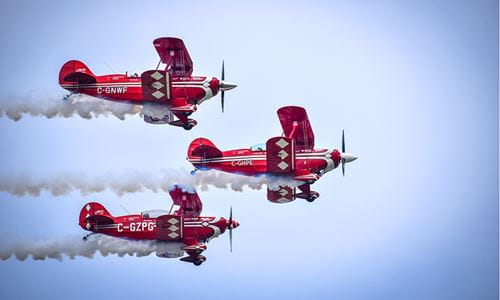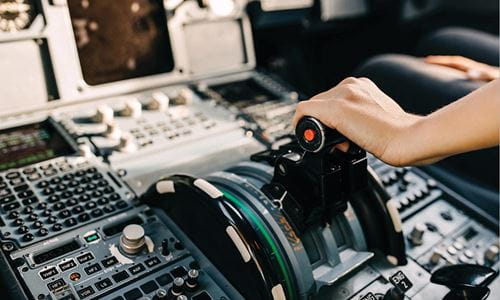
FFD Pilots Discuss Trends, Industry-Segment Performance

Senior elected leaders from ALPA’s nine regional pilot groups assembled at the Association’s McLean, Va., offices on May 16 to share information as part of the union’s biannual fee-for-departure (FFD) group meeting. Conducted by ALPA’s FFD Committee, this gathering also gave pilot group reps who fly for certain airline brands the opportunity to come together as part of joint standing committees to talk about mutual interests and ongoing concerns.
“It’s truly a remarkable time to fly for an FFD airline, with current pay rates and projected upgrades and flow,” said Capt. Adam Spurrier (Endeavor Air), the FFD Committee chair and Master Executive Council (MEC) chair for his pilot group. “At the same time, we must all recognize the precarious place that our carriers are in as the legacy and low-cost airline hiring trends remain strong. From speaking with many of you, this has led to ALPA volunteer pressures as well as rising training costs within our MECs.”
Turnover has become an ongoing theme within the North American regional airline industry, as many pilots opt to depart to carriers that fly larger aircraft, including regional first officers who’ve flown fewer than 1,000 turbine hours going to legacy carriers. This trend has led to some drastic response measures including forced-captain upgrades.
The FFD Committee hasn’t been immune to this constant transition as two of its four members—Capts. Justin Cunningham (Piedmont) and John Fremont (Air Wisconsin)—recently left their respective airlines to fly for mainline operators. The committee continues to seek replacements who fly for regional carriers within the United and American Airlines networks.
In addition, turnover in pilot leadership is compelling FFD pilot groups to look for new ways to capture in-house knowledge and experience, including loan-back programs and the development of continuity handbooks to aid new pilot leaders. Capt. Sean Creed (Spirit), ALPA’s national resource coordinator, spoke briefly to the group, mentioning the use of the ALPA Academy, the union’s learning management system, to help new officers bridge the experience gap and address industry-specific issues.
Capt. Jason Ambrosi, ALPA’s president, also met with the pilots and answered questions about the status of current merger talks and the E-3 and H-1B specialty-occupation visa programs, which enable airlines facing hiring challenges to temporarily recruit pilots from other countries.
Attending MEC chairs and vice chairs reviewed recent activities and accomplishments at their respective properties during what has become one of the more popular components of the FFD group meeting—the pilot group update for each of the carriers. Participating reps reported on the current number of pilots at their airlines, their fleet sizes and/or changes in flying, recruitment efforts, recent negotiations, and other related issues.
Of particular interest was a recent joint session held between the Delta and Endeavor Air MECs in which the two pilot groups passed a resolution of mutual support and established a joint working group to explore recapturing regional flying and strengthening mainline bottom-end scope—with a goal of all Delta passengers being flown by Delta pilots, with former regional pilots being brought aboard Delta.
Cost savings in operating the wholly owned subsidiary have declined as market forces have generated sizeable pay scales and bonuses within the FFD segment. Even though this pilot group currently has a flow agreement, providing a defined pathway to the Delta flight deck, Endeavor pilots have seen a majority of their pilots leave for a non-Delta carrier over the last 18 months, highlighting the continued growth and demand for pilots in the industry. The joint working group plans to report its findings and recommendations to the two MECs this fall.
In addition to pilot group updates and joint standing committee breakout sessions, Patrick Cropper, a manager in ALPA’s Economic & Financial Analysis Department, discussed recent market performance, trends, and projections for the FFD airline segment. He observed, “FFD block hours are down compared to 2019,” adding that airline brands are “upgauging fleets and shifting more flying to the mainline.” Part of the reason for this change was the recent business decision to sunset 50-seat aircraft such as Canadair CRJ200s and Embraer ERJ 145s.
The FFD Committee tentatively plans to continue these discussions at its next meeting on October 17, the day before the next regular ALPA Executive Board meeting.












